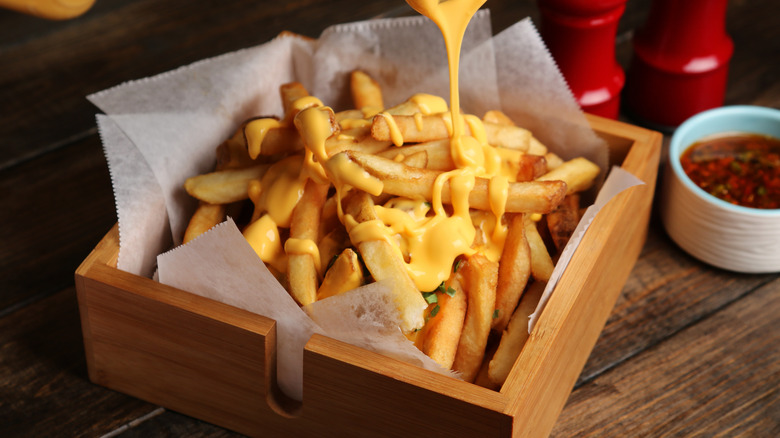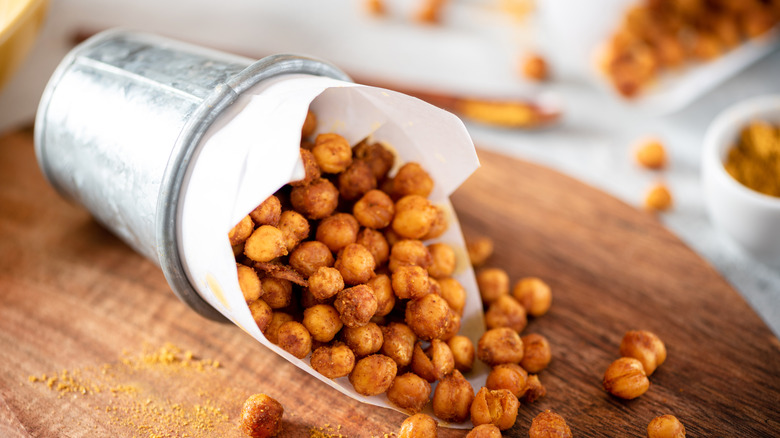
Are you craving French fries, baked potatoes, or salty snacks? It might be time to focus more on your needs. Food cravings can stem from physical or psychological causes, including stress, sleep deprivation, or vitamin deficiencies. “They may also result from a combination of social, emotional, cultural, and environmental cues,” explained registered dietitian Vandana Sheth in an interview with Shape.
For instance, sugar cravings often relate to stress, anger, or other negative feelings. Chocolate cravings might suggest a magnesium deficiency, while salt cravings could signal electrolyte imbalances. “If you exercise a lot, you’re sweating and losing salt, which means you end up craving [it] more to replenish those stores,” says nutritionist Dr. Lisa Young (via Shape). A 2018 study published in the Journal of Health Psychology indicates that chronic stress might be the culprit behind food cravings. This lifestyle factor not only triggers food cravings but also affects our eating patterns and can lead to weight gain.
But what does it mean when you’re craving French fries? Should you adjust your diet, get more sleep, or incorporate more “me” time into your routine? Read on to discover more.
This is why you are craving fries

French fries are rich in sodium, carbs, and fats. As previously mentioned, salt cravings might indicate an electrolyte imbalance, which can result from dehydration, strenuous workouts, or strict dieting. Stress may also drive your desire for salty foods, according to Holland and Barrett.
On the other hand, carb cravings are linked to fatigue, tiredness, or fluctuations in blood sugar levels. This explains why you might feel the urge to eat fries, bread, or pasta after a long day at work. Strict dieting can also contribute. “Typically, when someone is on a strict eating plan or has declared certain foods ‘off-limits,’ they will want them that much more,” dietitian Elizabeth DeRobertis told Shape.
A 2011 study published in the journal Proceedings of the National Academy of Sciences suggests that fries and other fatty foods stimulate the production of endocannabinoids in the brain, as cited by Live Science. Essentially, they have a similar effect to marijuana. These chemicals influence appetite and taste perception, increasing hunger and food cravings. The question is, what can you do about it?
Try these healthy alternatives to french fries

While they may be a better choice than potato chips or other snacks, French fries can still pose health risks. A 2017 study in The American Journal of Clinical Nutrition found that fried potato consumption can increase mortality risk. As noted by the researchers, this popular comfort food may lead to diabetes, obesity, high blood pressure, and other conditions linked to heart disease. However, you can mitigate these risks by exploring healthier options to satiate your cravings.
Oven-baked sweet potato fries offer similar flavors without the extra calories. Alternatively, try roasted parsnip fries, kale chips, air-popped popcorn, or roasted chickpeas. Meanwhile, aim to get more rest and manage stress. Strive for at least eight hours of sleep per night and avoid fad diets.
Focus on nutritious foods, stay hydrated, and snack on whole-grain crackers, pumpkin seeds, nuts, or leafy greens after exercise to prevent electrolyte imbalances. Canned beans, avocados, mushrooms, tuna, or dark chocolate are equally beneficial for athletes and gym-goers, suggests the National Academy of Sports Medicine.




